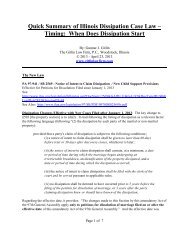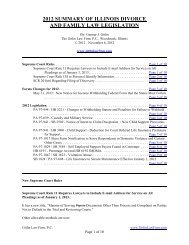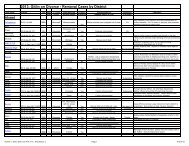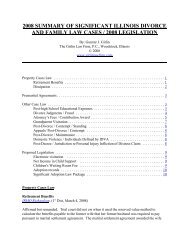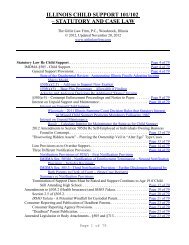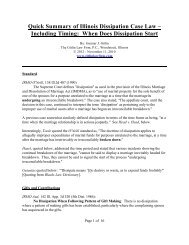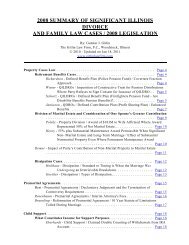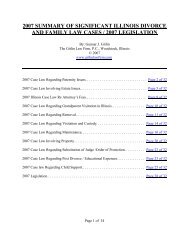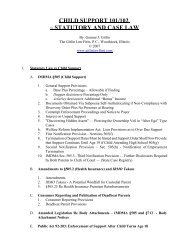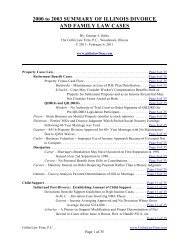Illinois Attorney's Fees and the Leveling the Playing Field Act
Illinois Attorney's Fees and the Leveling the Playing Field Act
Illinois Attorney's Fees and the Leveling the Playing Field Act
Create successful ePaper yourself
Turn your PDF publications into a flip-book with our unique Google optimized e-Paper software.
ought a motion to quash <strong>the</strong> discovery request in this regard <strong>and</strong> <strong>the</strong> trial court granted this<br />
motion. The appellate court affirmed holding that reasonableness of fees is a permissive factor in<br />
contribution proceedings ra<strong>the</strong>r than a m<strong>and</strong>atory factor. IRMO Hasabnis, 322 Ill.App.3d 582,<br />
749 N.E.2d 448 (1st Dist, 3d Div. 2001), GDR 01-95. The language of Hasabnis was curious. It<br />
states:<br />
We realize one court has held that under section 508(a) <strong>the</strong> trial judge "must," in<br />
making an award of fees pursuant to a contribution petition, "consider whe<strong>the</strong>r <strong>the</strong><br />
attorney fees charged by <strong>the</strong> petitioning party's attorney are reasonable." In re<br />
Marriage of DeLarco, ***. Although we do not see that requirement in any of <strong>the</strong><br />
relevant statutes, we need not decide whe<strong>the</strong>r we will part company with DeLarco<br />
on this point. It is clear to us <strong>the</strong> trial court did examine <strong>the</strong> amount of fees [<strong>the</strong><br />
wife] had paid <strong>and</strong> still owed her attorneys. The trial court was asked by [<strong>the</strong><br />
wife] to award fees it found "equitable, just, <strong>and</strong> in accordance with <strong>the</strong> provisions<br />
of section 503(j) * * *." We believe <strong>the</strong> trial court did so.<br />
The argument that reasonableness is a “permissive” factor is <strong>the</strong> argument set forth in David<br />
Hopkins' <strong>Illinois</strong> Bar Journal article, “‘<strong>Leveling</strong> <strong>the</strong> <strong>Playing</strong> <strong>Field</strong> in Divorce: Questions <strong>and</strong><br />
Answers About <strong>the</strong> New Law.” 85 IBJ, 410 (Sept. 1997). Hopkins suggests, “If contribution<br />
awards were to be determined on <strong>the</strong> basis of traditional section 508 criteria — i.e.,<br />
reasonableness <strong>and</strong> necessity of fees — <strong>the</strong> conflict of interest problem posted by prior law<br />
would have persisted.” Hopkins urges that contribution awards should be determined “ in a<br />
manner akin to o<strong>the</strong>r types of debts in <strong>the</strong> divorcing couple's marital estate.”<br />
Hasabnis tried to make a distinction in stating that necessity is not an element of <strong>the</strong> contribution<br />
statute but that fees still must be reasonable. The specific quote as to reasonableness states:<br />
“Section 503(j) does not expressly require <strong>the</strong> award of fees be reasonable, but since we cannot<br />
envision a grant of legislative authority that tells judges to be unreasonable, we read <strong>the</strong> statute<br />
as incorporating a reasonability requirement.” While <strong>the</strong> appellate court gave lip service to<br />
reasonableness being a factor, it <strong>the</strong>n went on to appear to reject this assumption. Picking up<br />
from <strong>the</strong> argument made in <strong>the</strong> Hopkins' <strong>Illinois</strong> Bar Journal article <strong>the</strong> court stated, “A critical<br />
examination of <strong>the</strong> reasonableness of <strong>the</strong> petitioner's attorneys' fees would not be consistent with<br />
<strong>the</strong> obvious goals of section 503(j) -- to avoid conflicts of interest between petitioner <strong>and</strong> her<br />
attorney <strong>and</strong> to preserve <strong>the</strong> lawyer-client privilege.” I disagree. As pointed out in DeLarco, a<br />
finding of reasonableness or unreasonableness in a contribution hearing may not be asserted<br />
against <strong>the</strong> attorney in a hearing for attorney's fees against ei<strong>the</strong>r a client or former client.<br />
It is urged that <strong>the</strong> First District appellate court decision is poorly reasoned <strong>and</strong> <strong>the</strong> Second<br />
District's DeLarco decision was better reasoned. It does not make sense to exact <strong>the</strong> supposed<br />
conflict of interest between lawyer <strong>and</strong> his or her client when he is pursuing a fee contribution<br />
petition as against <strong>the</strong> depth of <strong>Illinois</strong> law which requires fees to be reasonable. It is urged that<br />
<strong>the</strong> court is not in a position to properly determine whe<strong>the</strong>r fees are reasonable unless detailed<br />
billing records are submitted.<br />
Gattone — A Second 2nd District Case Holding <strong>Fees</strong> Must be Reasonable: We have one<br />
Gunnar J. Gitlin Gitlin Law Firm, P.C. www.gitlinlawfirm.com




